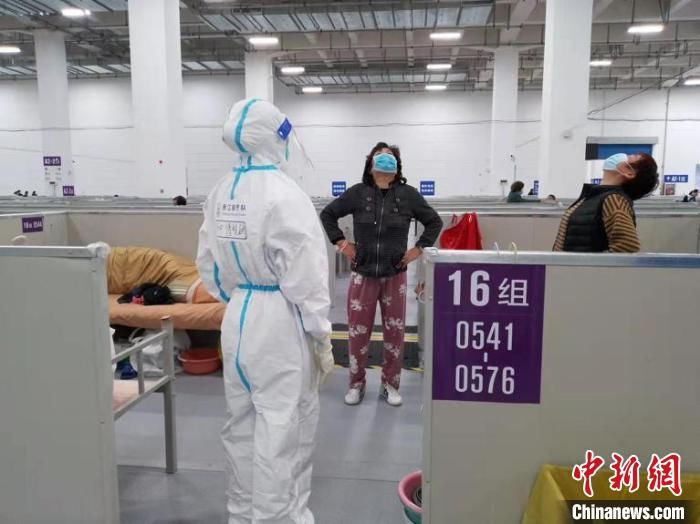
Medical staff guide patients on health exercises. Photo courtesy of Hangzhou Hospital of Traditional Chinese Medicine
Chinanews.com, Hangzhou, April 28 (Zhang Yuhuan and Cui Qianxian) “Come on Shanghai, we will win the fight against the epidemic”, “We want to get well soon”, “I miss my mother’s cooking”… In a corner of Shanghai Lingang Makeshift Hospital, On the blank wall are sticky notes full of blessings and misses, forming the appearance of a “love tree”. Here, the medical staff and patients of Hangzhou Hospital of Traditional Chinese Medicine, who have been in Shanghai for more than 20 days, watch each other and do health exercises together.
“From the moment I stepped into the cabin, I felt a sense of mission in my heart,” said He Liping, a surgical nurse in Dingqiao District, Hangzhou Hospital of Traditional Chinese Medicine. Environmental sterilization, patient inspections, dinner distribution, health education… In the cabin, the team members’ orderliness reassured the patients.
Because most of the patients admitted to the Fangcang shelter hospital are mildly ill, the team members often need to accompany the patients more. After learning that a patient had insomnia every night due to the inability to adapt to the environment, He Liping instructed the patient to follow the video to do some simple health exercises and auricular acupuncture whole ear massage before going to bed. From the next day, the patient’s sleep condition improved.
At the same time, taking into account the discomfort of patients in bed for a long time, Fu Xiaoting and Shu Qiongyan, nurses in the Orthopedics and Traumatology Department of Hangzhou Hospital of Traditional Chinese Medicine, also improved the original cervical spine exercises. Because most of the patients in the cabin are migrant workers and middle-aged and elderly people, the movements they designed are mainly simple and easy to understand and do. At the same time, they recorded a video of simple cervical spine exercises and made a QR code for patients to learn without contact and intuitively. .
“While recuperating and resting in bed, don’t forget to protect your cervical vertebrae. Do cervical vertebra exercises by yourself before and after playing mobile phones, refuse to do ‘bow-headed people’, and stay away from cervical spondylosis!” After dinner, Fu Xiaoting was in the cabin Picking up the loudspeaker and calling on the patients to “move”, as the beat sounded, many patients consciously followed her to perform cervical spine exercises at a distance of two meters.
Aunt Chen (pseudonym), who lived in the cabin for 5 days, said to the team members before leaving the hospital: “Thank you for leading us to do Baduanjin, cervical spine exercises, finger exercises, and chair exercises, which have strengthened our physique. I thank you all from the bottom of my heart!”
The recovery and discharge of the patient is the greatest gratification for the medical staff. In the middle of the night, Han Wanchun, a surgical nurse in the Dingqiao District of Hangzhou Hospital of Traditional Chinese Medicine, finally finished her day’s work and took off her sweaty protective suit. After returning to the station, she turned on her mobile phone and saw that her father, who has always been reticent, wrote down his thoughts about his daughter on social platforms. “You’ve worked hard, child. You haven’t been home for three years, and your parents miss you so much…” For a while, the thoughts of homesickness flooded into my mind again.
“Everyone is working hard for this battle. I will persevere and look forward to reuniting with my family safely as soon as possible,” Han Wanchun said. (End)